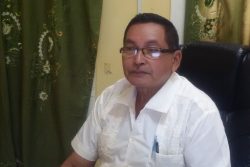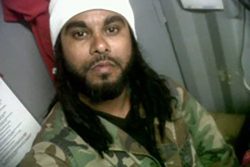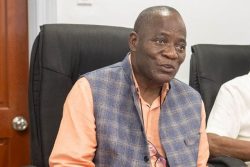Things have not been the same since the general elections in November 2011, though, as Guyanese would say, the outcomes – or at least the majority of them – were hardly anything to write home about, anyway.
Some of the outcomes of the poll made history…not in an earth-shattering way, but history, anyway. The elections marked the culmination of the single longest presidency in the country’s history. Before Mr. Jagdeo departed the presidency there had been talk that he would seek to retain office for a third term.
There were other pieces of history too. The outcome of the poll brought to the National Assembly a Leader of the Opposition who was new to both the political centre stage and the Parlia-ment. Unusually too, he had earlier had to compete for the leadership of the People’s National Congress.
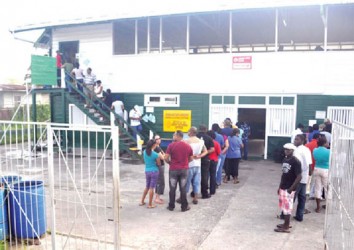
The 2011 general elections also altered the mathematics of the Parliament in a numerically small but politically significant way. For the first time ever the executive occupies fewer seats than the parliamentary opposition in the National Assembly. That fact has been central to the lion’s share of our political agenda over the past thirty months or so.
On the other hand the more things have changed the more they have stayed the same. The theme of a “return to democracy,” has been a recurring one in our national political discourses, except that the only serious measuring rod that we ever seem to apply is the five-yearly confrontation at the polling booth. It does not, it seems, bother us one little bit that the outcomes of general elections do no more than accord the winner the right to rule. The mathematics of the poll is really the least consequential part of the democracy process. Real democracy is about how close the people are to affecting the decision-making process over the longer haul. In other words, democracy has to do with the extended political process rather than the singular act of making choices at the polling booth.
However much we pretend to the contrary, therefore, people are separated from the political process in Guyana, firstly, on account of an entirely understandable disinclination to embrace the tedium that passes for politics and, secondly, by the fact that there is, at any rate, a yawning gap between the electorate and access to real power.
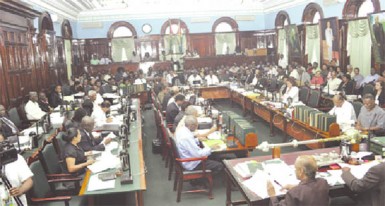
We vote then we stand aside. Never mind that for the people, by the people axiom. The exercise of power is the purview of those who rule. Real communication between those who seek to govern and those who we loosely describe as the electorate stops on the final day of political campaigning before we go to the polls.
Increasingly, there is less evidence of a political process – that is to say an exercise that manifests itself in an ongoing and meaningful discourse between those who wield power and the people. These days, almost as a general rule, people make clear their profound disinterest in the politics of the day, mostly on the grounds that it does little to enhance their lives, anyway. They see politics not as a process of which they are an integral part, but as something that is the domain of a separate breed, people different from ourselves. That makes our politics a kind of theatre. That is how it has always been.
What of the past two and a half years or so? It has been mostly more of the same except that the political cat-sparring stemming from the one-seat majority has become the newest national attraction. What the one-seat majority has done is to breathe a measure of animation into a previously comatose Parliament. These days, the television cameras are less able to expose the ‘sleepers.’ With so much at stake, particularly during those uproarious budget debates, every occupant of every seat in the Parliament must sing for his or her supper. The transformation has been spectacular though it would be interesting to see the results of a national poll that asks a singular question………how much difference has all of that made in real terms?
The matter of the executive not controlling the National Assembly has been an acute political humbug to the ruling party. It has griped and grumbled its way through the past thirty or so months, making no secret of its view that the
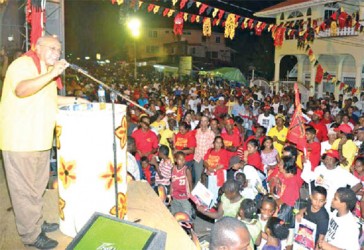
precedent which it must endure is an affront to its status as the party in power.
As far as the political opposition is concerned there is no question than that the one seat majority served to render political opposition more relevant inside the National Assembly and there are those who would contend that that is probably the only meaningful thing that November 2011 did for real democracy. The question that arises, however, is whether the change in the mathematics of the National Assembly has done anything to enhance democracy at the level of the quality of governance. After all these years of political independence is the will of the people anything more than a convenient political cliché?.
With political parties politics has always been about power and about control, in the first instance. It is hard for them to imagine it any other way and there are times when the contemporary reality has thrown up evidence of a measure of confusion on all political sides as to how to correctly behave in a National Assembly that functions under a regime that comes as close as it ever has to a democratic environment.
What conceals the real motive of our politicians is their possession of a language which they employ to provide what are, too often, false assurances. Sometimes the motive is downright deception.
On the government’s side there have been legal interventions to bring an end to budget cuts and threats of ‘snap elections’ to ask the electorate to restore the accustomed status quo. On the Opposition’s side there has been increasing evidence of an awareness of a new found relevance in the National Assembly and an understanding that their leverage allows for a somewhat greater evenness in the balance of power; though, sometimes, this is accompanied by a kind of bewilderment linked presumably to the newness of the experience.
The people, meanwhile, have long fashioned a political space of their own. Inside their ‘parliament’ of ceaseless chatter the discourse centres around myriad themes ……………like what is widely believed to be a nexus between politics and corruption; the rise of a drug-connected elite; astonishing evidence of affluence manifested in urban, high-rise buildings that give rise to conversations about money-laundering; crime and the woeful underperformance of the police; the seeming national passion for guns; the monotonous regularity of of murder: the maiming and killing of women; trafficking in humans and the abuse of children.
Almost always, the discourses in the people’s parliament embrace these themes an d, truth be told, all too frequently, they march, sometimes even exceed in their relevance and their urgency that which generates discourse in the National Assembly.
Other changes continue to materialize. Over time, we have become victims of the most horrific disfigurement arising out of our accommodation of sometimes made to appear like a sport, a manifestation of perverse power that is not attended by suitable legal sanction. There are people in our society who simply go around playing God and the powers that be are either unable or disinclined to curb the habit..
The transgressors poke the legal system in the eye with impunity and laugh in the faces of those who are shocked and bewildered by their performances. Indeed, there are occasions too when the wheels of justice seem not to turn at all, as if, sometimes they become corroded by the frequency and the weight of the unlawful interventions designed to spare the powerful the consequences of their misdeeds.
Meanwhile, those who are the victims of flawed justice come to understand the reality of a society that appears, increasingly, to be driven by the notion that might and means are equivalent to right.
Part of the reason why the media have lost some of their potency has to do with the fact that nothing shocks anyone any longer, so that we have come to take shocking banner headlines in our stride. These days, we devour those as though they were part of our breakfast. Even when they have to do with the most shocking occurrences, their potency has become diluted by the frequency with which they occur. Always, there is a sense that this one has to be allowed to pass with a minimum of fuss because we must make way for the next shocker that is bound to follow quickly.
There has always been an instinctive inclination among those who rule to exercise a measure of control over the media. It has to do with minimizing opportunity for criticism. Public criticism, particularly when is even remotely approximates the truth, is the bane of our politicians’ existence.
These days, the information super highway makes censorship more difficult but as is evidenced in some countries, politicians will sometimes stop at nothing to get their way. Here in Guyana it is the traditional media houses- those that decline to toe the official line that feel the heat……….from time to time. Big Brother is always watching and the comfort zone is never really as comfortable as we think.
The truth about our democracy is that it is picky about people’s freedoms.. You can talk back to authority; the problem arises when you get it into your head that you have right to be listened to and to have your grouse favored with corrective action.. That is not part of the deal in our democracy.
The endless arm-wrestling among our politicians is not about serving the people. It is about who rules and who benefits from the perks of power………… – whatever those may be.
Take the Georgetown municipality, for example. Its shortcomings have as much to do with the worn out political football it has become as it has to do with its own monumental ineptitude. The incumbents, the Mayor and the Council may have been in office for far too long but the clamor for Local Government Elections is no more than part of the customary political clamor…………. Except, apart from the elections, we can, somehow, invent a political environment in which a municipality can function.
The game, however, has long been up. The people have long come to understand that politics is theatre and that what passes for democracy is a barely bearable governance process. People’s power may still be strictly
limited but there is no longer a question of the masses being fooled. With everything out in the open we are left to wonder as to the direction in which our politics is heading.



